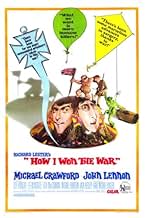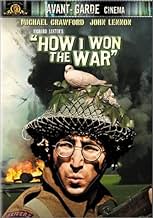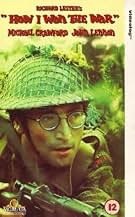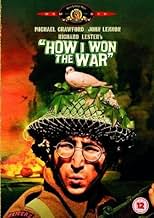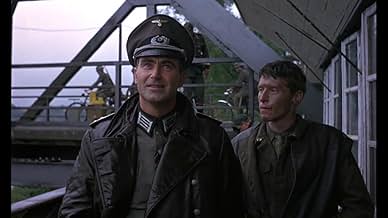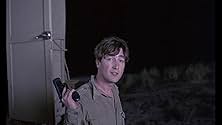IMDb-BEWERTUNG
5,5/10
2626
IHRE BEWERTUNG
Die Geschichte eines britischen Kommandeurs während des Zweiten Weltkriegs, der seine Truppen in eine Reihe von Missgeschicken in Europa und Nordafrika bringt.Die Geschichte eines britischen Kommandeurs während des Zweiten Weltkriegs, der seine Truppen in eine Reihe von Missgeschicken in Europa und Nordafrika bringt.Die Geschichte eines britischen Kommandeurs während des Zweiten Weltkriegs, der seine Truppen in eine Reihe von Missgeschicken in Europa und Nordafrika bringt.
- Regie
- Drehbuch
- Hauptbesetzung
Empfohlene Bewertungen
Take a movie like this. You may have heard somewhere that it was pretty bad. But, being an inquisitive sort, you visit IMDb first anyway. Here, you are greeted with plenty of reviews that tell you that it's not so bad - some even call it a masterpiece and a hidden gem.
Then, you watch it and the cold hard reality hits you - it's just not that good of a movie. The first half an hour seemed to take about four. Yes, there are "innovative" aspects such as tinting people and scenes differently, but ultimately this is cheap and adds little.
There are far better anti-war films of the same period. "How I Won the War" with a big star (Lennon) was made in 1967. Steve McQueen's "The Sand Pebbles" of 1966 is, although a much longer movie, an infinitely better anti-war film that managed to convey all of the same philosophical points as HIWtW (and more) and do it with subtlety, class, and genuine humanity.
The saving grace of HIWtW should have been comedy - absurdist or otherwise. The ingredients were there - war and military life are just asking for the application of ironic and observationalist British wit. Alas, while the characters spend most of the time speaking in that fast British way as if they were saying something as clever as, say, Monty Python or Fawlty Towers, what they actually say is substantially less interesting. Pity.
This film is not particularly worth watching.
Then, you watch it and the cold hard reality hits you - it's just not that good of a movie. The first half an hour seemed to take about four. Yes, there are "innovative" aspects such as tinting people and scenes differently, but ultimately this is cheap and adds little.
There are far better anti-war films of the same period. "How I Won the War" with a big star (Lennon) was made in 1967. Steve McQueen's "The Sand Pebbles" of 1966 is, although a much longer movie, an infinitely better anti-war film that managed to convey all of the same philosophical points as HIWtW (and more) and do it with subtlety, class, and genuine humanity.
The saving grace of HIWtW should have been comedy - absurdist or otherwise. The ingredients were there - war and military life are just asking for the application of ironic and observationalist British wit. Alas, while the characters spend most of the time speaking in that fast British way as if they were saying something as clever as, say, Monty Python or Fawlty Towers, what they actually say is substantially less interesting. Pity.
This film is not particularly worth watching.
Incompetent Lieutenant Goodbody leads a group of recruits who grow to hate their commander. They train in a mock up of WWI trench warfare. They land on North Africa to battle the Nazis. The biggest draw is John Lennon playing a supporting character. It's a surreal anti-war dark comedy. Director Richard Lester uses various methods including breaking the 4th wall and doing a faux documentary. I am often reluctant to rate foreign comedies when half of it is lost in translation. In this one, the thick British accents and unknowable foreignness make much of it incomprehensible. Mostly, it's not that funny. The bigger war footage is recycled while there are some smaller action. There is an anti-war message but it's a muddle of outlandish surrealism. On its most basic element, it's hard to follow and not that funny.
Although (unfairly) ravaged by critics at the time and so generally dismissed ever since, HOW I WON THE WAR is both a brilliant anti-war film and anti war film film (much more so than the usually heralded M*A*S*H). Filled with biting satire and brilliant performances from Michael Crawford, John Lennon, Roy Kinnear, Ronald Lacey, Michael Hordern and, well, the entire cast, HIWTW was perhaps a bit too odd for 1967 audiences who expected perhaps a more madcap adventure, but today it deserves not only a rethink - but a reissue on DVD. (Why this wonderful movie is not available on DVD (at least in the US) is yet another slap in its face.) Richard Lester and writer Charles Wood (who also wrote HELP! for the Beatles) have crafted a brilliant black comedy that easily stands with Dr Strangelove. It won't be everyone's cup of tea, granted, but if you forget your preconceptions and let it wash over you, you will be richly rewarded. RELEASE IT ON DVD!
'How I Won the War' has to be one of the most original, bizarre and imaginative war films ever made. I first saw it late one night as an impressionable kid and immediately was drawn by its unusual style and narrative. To have the film tinted in several different colours to show the stages of the war was both daring and cool. One gets the feeling of having witnessed something larger, more intimate and important than just a mere war movie.
There are no real heros in this film, certainly Michael Crawford and his troop are pretty cowardly and inept, whereas the Germans are depicted, in the raid on the fuel dump scene, as being content with religious service and a bit of soccer.
It is true that history is written by the victors and Michael Crawford's character, Goodbody, is one of only two survivers from his regiment. He proudly states at the very end of the film that he "won the war". Maybe he did, but his actions and his balmy enthusiasm show us just how idiotic war can be.
My favourite scene was the one with Goodbody and the German officer who befriends Goodbody for much of the film. Together, they talk about how cruel both the British and Germans are, and how the German officer has killed many Jews. Goodbody then talks about how he got his commission and why he is fighting. It ends with the German officer telling Goodbody that he (Goodbody) is a fascist. "Am I?", replies Goodbody, "but I don't particularly dislike Jews."
When the very affable German officer, who is attempting to surrender, is blindly run over by an advancing British tank, we know that in this war the good, the bad and the ugly become mixed up and inseperable.
I currently own a very worn out video of the film and am hoping it will be released soon on DVD here in Australia.
There are no real heros in this film, certainly Michael Crawford and his troop are pretty cowardly and inept, whereas the Germans are depicted, in the raid on the fuel dump scene, as being content with religious service and a bit of soccer.
It is true that history is written by the victors and Michael Crawford's character, Goodbody, is one of only two survivers from his regiment. He proudly states at the very end of the film that he "won the war". Maybe he did, but his actions and his balmy enthusiasm show us just how idiotic war can be.
My favourite scene was the one with Goodbody and the German officer who befriends Goodbody for much of the film. Together, they talk about how cruel both the British and Germans are, and how the German officer has killed many Jews. Goodbody then talks about how he got his commission and why he is fighting. It ends with the German officer telling Goodbody that he (Goodbody) is a fascist. "Am I?", replies Goodbody, "but I don't particularly dislike Jews."
When the very affable German officer, who is attempting to surrender, is blindly run over by an advancing British tank, we know that in this war the good, the bad and the ugly become mixed up and inseperable.
I currently own a very worn out video of the film and am hoping it will be released soon on DVD here in Australia.
No, this not a "lost gem", as some reviewers excitedly proclaim. Far from it.
"How I Won the War? I Bored Them to Death". Main deficiency: a very boring movie. Another deficiency: the gags are practically all unfunny. It's a typical 60s British comedy; good cast, but an atrocious script. Well filmed, though; visually it's pretty decent. However, good for only one or two chuckles. And it was more like a hopeful chuckle, sort of like "I hope this is a sign that something genuinely funny is coming up soon". "How I Can Bore You" would be a more appropriate title. Very disappointing.
A little word about John Lennon, for all you left-wing Lennon fans. (The music is great, hence that's not the issue here.) Lennon was a working-class kid with very little education and even less natural intelligence. His pathetic attempts at "spiritual contentment" - or whatever he used to call it - with that charlatan of an Indian guru sect-leader, plus his marriage to the even bigger charlatan, the totally talent-free Yoko Ono, prove this without an iota of a doubt. He was a very gullible person, what Americans would call "a sucker". But if that isn't enough, his meddling in international politics proved that he had also completely lost his mind by the time he left "The Beatles" and the 70s arrived. Drugs? Too much fame going to his head?
He was also a stark-raving hypocrite, as most "do-gooders" are. All that the world's do-gooders care about is their fame and their image; after all, they have huge EGOS to feed. An example... Michael Caine, in his autobiography "What's It All About?", relates the following episode from the mid-60s when he met Lennon. They were in a luxurious French hotel, desperately looking for a bathroom. All the bathrooms were taken. So John went to a room and urinated from a window. Caine saw him and said angrily that John had stained the curtains. And what was John's reply to this?
"They're rich. F*** 'em."
Of course, the fact that he himself was rich at that point (not to mention later) was of no consequence. Because if someone had decided to stain HIS curtains, in HIS home with urine or excrement, I guess he would have blown his top, screaming injustice. And he'd probably have called the police. The "pigs". Yes, he was so anti-authority, except of course when he needed them to serve HIS little purposes. Just another "do-gooder" hypocrite...
"All we are say-ing, is give peace a chance". If peace is responsible for "heroes" like Lennon, then I'm all for war.
For my review of "Imagine", go to: http://rateyourmusic.com/collection/Fedor8/
To make this IMDb's most unpopular comment ever, please click "No" below.
"How I Won the War? I Bored Them to Death". Main deficiency: a very boring movie. Another deficiency: the gags are practically all unfunny. It's a typical 60s British comedy; good cast, but an atrocious script. Well filmed, though; visually it's pretty decent. However, good for only one or two chuckles. And it was more like a hopeful chuckle, sort of like "I hope this is a sign that something genuinely funny is coming up soon". "How I Can Bore You" would be a more appropriate title. Very disappointing.
A little word about John Lennon, for all you left-wing Lennon fans. (The music is great, hence that's not the issue here.) Lennon was a working-class kid with very little education and even less natural intelligence. His pathetic attempts at "spiritual contentment" - or whatever he used to call it - with that charlatan of an Indian guru sect-leader, plus his marriage to the even bigger charlatan, the totally talent-free Yoko Ono, prove this without an iota of a doubt. He was a very gullible person, what Americans would call "a sucker". But if that isn't enough, his meddling in international politics proved that he had also completely lost his mind by the time he left "The Beatles" and the 70s arrived. Drugs? Too much fame going to his head?
He was also a stark-raving hypocrite, as most "do-gooders" are. All that the world's do-gooders care about is their fame and their image; after all, they have huge EGOS to feed. An example... Michael Caine, in his autobiography "What's It All About?", relates the following episode from the mid-60s when he met Lennon. They were in a luxurious French hotel, desperately looking for a bathroom. All the bathrooms were taken. So John went to a room and urinated from a window. Caine saw him and said angrily that John had stained the curtains. And what was John's reply to this?
"They're rich. F*** 'em."
Of course, the fact that he himself was rich at that point (not to mention later) was of no consequence. Because if someone had decided to stain HIS curtains, in HIS home with urine or excrement, I guess he would have blown his top, screaming injustice. And he'd probably have called the police. The "pigs". Yes, he was so anti-authority, except of course when he needed them to serve HIS little purposes. Just another "do-gooder" hypocrite...
"All we are say-ing, is give peace a chance". If peace is responsible for "heroes" like Lennon, then I'm all for war.
For my review of "Imagine", go to: http://rateyourmusic.com/collection/Fedor8/
To make this IMDb's most unpopular comment ever, please click "No" below.
Wusstest du schon
- WissenswertesThis was the first time John Lennon wore his soon-to-be-trademark granny glasses in public.
- PatzerWhen Goodbody lands on the beach, he eventually comes across rows of helmets with black capercaillie feathers, representing a military graveyard, with a French flag at half-mast. No French troops wore helmets like this, but the Italian Bersaglieiri did.
- VerbindungenFeatured in Film Review: Film Review (1967)
- SoundtracksAuf Wiedersehn, Sweetheart
(uncredited)
Written by Eberhard Storch, English language lyrics written by John Turner and Geoffrey Parsons
Performed by Vera Lynn With Soldiers and Airmen of Her Majesty's Forces
Top-Auswahl
Melde dich zum Bewerten an und greife auf die Watchlist für personalisierte Empfehlungen zu.
- How long is How I Won the War?Powered by Alexa
Details
- Laufzeit
- 1 Std. 49 Min.(109 min)
- Farbe
- Seitenverhältnis
- 1.66 : 1
Zu dieser Seite beitragen
Bearbeitung vorschlagen oder fehlenden Inhalt hinzufügen





